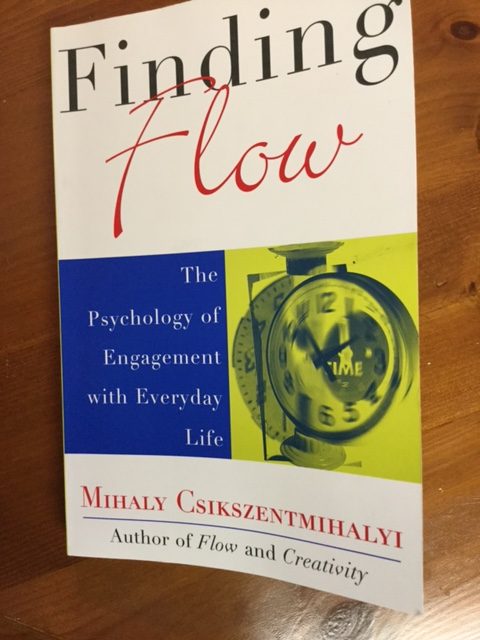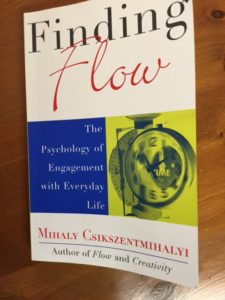
 Each year for my job, I set a goal to read one book per quarter on a particular topic. This year’s topic is creativity, and so far I’ve read Big Magic & A Curious Mind.
Each year for my job, I set a goal to read one book per quarter on a particular topic. This year’s topic is creativity, and so far I’ve read Big Magic & A Curious Mind.
This quarter I read Finding Flow: The Psychology of Engagement with Everyday Life by Mihaly Csikszentmihalyi, copyright 1997.
Here is a little quiz before we start — scroll to the end for answers.
- Why do both teens and adults choose passive activities during free time, such as watching TV or reading something that is not challenging, when active leisure activities are twice as likely to make people feel good?
- Which is more likely to cause feelings of listlessness and apathy?
- free time
- work time
- time spend in hobbies or sports
- What day of the week has higher rates of depression and symptoms of illness?
After posting my review of Big Magic, a friend in the Poetry Friday community (Hi Myra!) started a discussion with me about her scholarly frustrations with the book. I asked for recommendations, and she suggested Finding Flow: The Psychology of Engagement with Everyday Life.
This is not a “how to be more creative” book or a “you can be more creative if you show up for the Muse” book, but a research-based book detailing the factors involved in what the author calls “flow.” In sports, it’s called “being in the zone.” It’s the marvelous state in which time passes with little awareness, we are so engaged in whatever it is we’re doing.
The good news is the author’s research has led him to assert the quality of our lives is directly related to our choices — how we spend our time, the people in our lives, our ability to set goals and take charge of the direction we are headed, and how we feel about all of these factors. Early in the book he states, “… one of the most essential decisions any of us can make is about how one’s time is allocated or invested.” He posits our life experiences related to work, maintaining our lives/bodies/homes, and our free time — and how we choose to spend our time and energy, “will determine whether the sum of our days adds up to a formless blur, or to something resembling a work of art.”
When you think back over 2016 so far, do you see a blur or an emerging work of art?
Wait, what — it’s 2016?!
What may come as a surprise to other readers, as it did to me, are his findings about the circumstances or activities in which research participants report the greatest “flow experiences.” It’s not typically leisure activities, especially passive leisure activities, but situations in which we set goals that are just beyond the reach of our current skills so we are absorbed in overcoming the challenge and receiving immediate feedback to guide our next actions. Other than the athletic field, the most common place to find all of the elements required to produce flow is . . . work.
“When the job presents clear goals, unambiguous feedback, a sense of control, challenges that match the work’s skills, and few distractions, the feelings it provides are not that different from what one experiences in a sport or an artistic performance.”
FYI: his research shows eating is one of the most positive parts of the day for his subjects, but rarely an occasion for flow.
Csikszentmihalyi suggests we all pay closer attention to our daily lives and notice how we feel, then engineer our lives with a focus more on how we approach activities more than focusing on the activities themselves to find what works best for each of us. He strongly encourages us to not consider only ourselves, however; but to live lives that contribute in positive ways to our communities, have little impact on the environment, and invest in our family and friends in deliberate ways to encourage flow experiences within these relationships.
As someone who likes order, structure, and a plan, I found plenty in Finding Flow to resonate, as Csikszentmihalyi is not a fan of passivity and is a big fan of discipline, learning, and focused attention. He even goes so far as to say his research resulted in plenty of evidence that even if one does not achieve “flow,” simply doing something in line with one’s goals “improves the state of mind.”
Toward the end of the book, the author suggests taking responsibility for one’s actions and learning to love “fate” or “what we have to do” lead to more satisfaction with life. Or, as I imagine my father would say, “be a grown-up.”
In terms of creativity, the message I am taking from this book aligns perfectly with what most professional writers will tell you, including the famed Jane Yolen, whose creative philosophy is contained in three words: “Butt in chair.” For all that I’d would love to be like J.K. Rowling and have an inspired vision of a dark-haired orphan who finds out he’s a wizard and go on to be a billionaire, my greatest chance at finding flow is to pursue it with a plan, goals, challenges, and determination to enjoy the process, not focus on the product.
Answers to the quiz:
- Upfront energy outlay is the reason we choose passive activities over active leisure activities. It simply takes too much effort to get started.
- Free time is more likely to cause feelings of listlessness and apathy! (Idle hands and all that.)
- Sunday has the higher rates of depression and symptoms of illness, ostensibly because people have too much free time on their hands and are out of a regular routine. (Not because Monday is coming, as one might think.)
I love this post. I learned about Csikszentmihalyi (yes, I copied and pasted his name) and the concept of flow in my gifted creativity class, my favorite class in my masters program. I am so glad to revisit these ideas.
On another note, so fun to see you this weekend.